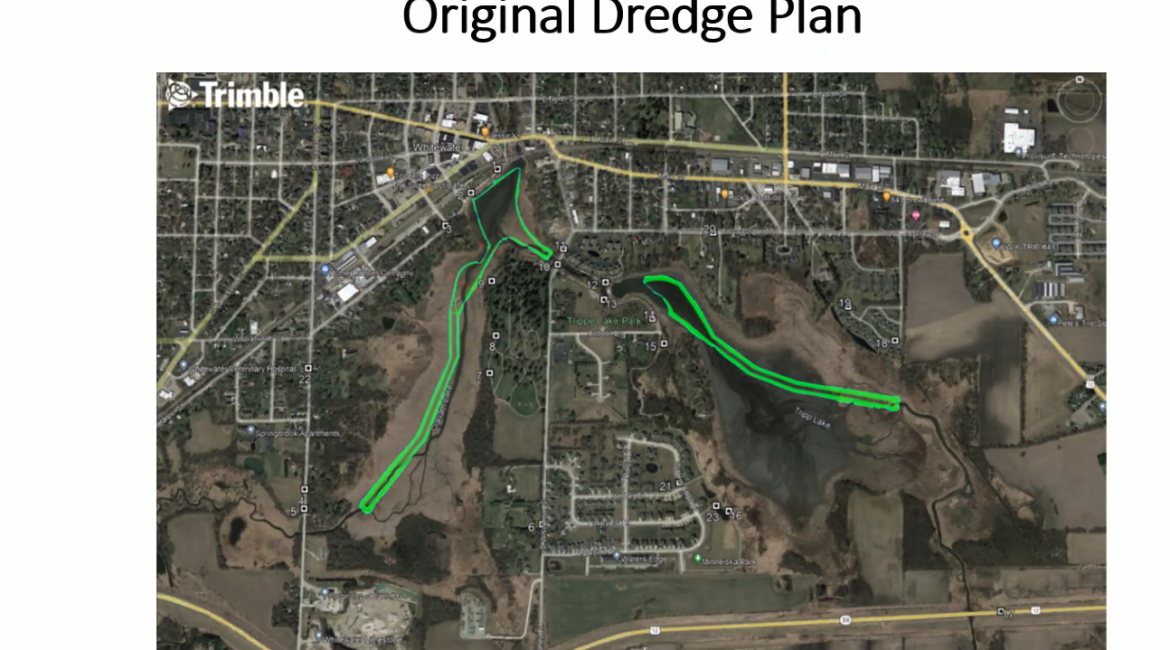By Kim McDarison
Dredging activity in Whitewater’s Trippe and Cravath lakes is winding down, according to information shared Tuesday during the city’s common council meeting.
An update about the city’s lakes dredging project was shared with council as part of the city manager’s report.
During his report, City Manager Cameron Clapper said that the total number of cubic yards removed during the dredging process was less than initially planned. The process removed some 68,000 cubic yards of spoils from the two lake beds. Original estimates were closer to 81,000 cubic yards, he said.
“It’s actually a significant positive above what we anticipated when weather started warming up,” Clapper said.
Aided by slides, City of Whitewater Parks and Recreation Director Eric Boettcher also provided information about the dredging project.
He described spoils collecting at the DNR-approved disposal site near the Whitewater University Innovation Center, 1221 Innovation Dr., as “a lot of dirt.”
Sharing slides denoting areas for dredging, Boettcher made comparisons between areas originally planned for dredging and areas that had, as of March 1, been dredged.
In Cravath, Boettcher said, “We dredged pretty much what we had planned on for the navigation channel. Instead of wasting time and effort dredging the contaminated area, we skipped that, because they had actual stream cut through that area. So that naturally connected our area. And there’s a couple of reasons we did this. One, we were able to dredge more areas in front of the park, as we are running out of cold weather, and also that way we don’t have to worry about where we deposit that material. Since we haven’t had to deal with a contaminant issue, we can just deposit it all in the same spot, so we don’t have to worry about that.”
In Trippe, Boettcher said: “We were able to do the navigation channel all the way up to pretty much where the boat launch is. Unfortunately, the weather has gotten too warm and we are not able to dredge much around the Trippe Lake park area. Again, it got too wet and it’s too sloppy to be able to dredge that area at this time.”
Pointing to a photo, which he said, was taken early last week, Boettcher noted: “This kind of shows the whole navigation channel. You can kind of see how wide it is, and this is where they kind of dredged from the middle, then worked their way towards the south end of the lake, and once they got to the south end, they dug. And this is kind of where they were going to connect to the existing stream.”
Looking at costs, Boettcher said that the project was currently under budget, adding that, thus far, dredging expenses were approximately $1,046,000, which, he said, was under the budgeted $1.375 million the city had set aside for the project.
“We still have some additional funds to look at using. One of the things we looked at is maybe doing a little bit of hydraulic dredging in those areas around the lake that we can’t get to at this point, but, overall, we’re pretty happy with the weather that we had and what we were able to accomplish,” Boettcher said.
Clapper asked Boettcher to share with council information about ongoing activities involving dredging along some of the lakebed shoreline, citing the activity as private dredging projects on private property.
Boettcher said the activity had been approved by the Wisconsin Department of Natural Resources (DNR), which, he noted, had worked to aid residents with the permitting process to allow private dredging projects to move forward while the weather was still cold.
Said Boettcher: “There were residents along the lake that have their own dredging projects, and, at the beginning of this, we were always told that you can’t do a blanket permit, or have them attached to our permit. While with the whole dredging project, overall, the DNR was allowing those that did put their permits in in January to tag onto our permit, in order to save time, because usually it’s a 90-day process.
“So that way, residents who had already started their permitting process were able to get their permits a little earlier so that they could still do their dredging while it’s still cold. I know it’s not cold enough for the bigger equipment, but a lot of the shoreline is still able to be dredged. That dredging is going to be taking place; they were able to get their dredging permit this week … so they are going forward with their projects.
“So that adds to our permit — so it falls under our permit — which means they have to use our dredging (spoils deposit) sites, but we have plenty of room out at the Innovation Center to accommodate that. We are looking at an additional 4,000 cubic yards total between all the potential dredgings that will come forward from those residents that are doing their own dredging project.”
Clapper said council would receive its next update on the lakes dredging project at its next meeting, scheduled for March 15.
During that update, Clapper said, he anticipated sharing with council “more details about where we ended and mobilization of all of the equipment, and the contractor moving out of the space.”
An earlier story about the scope of dredging to be performed within Trippe and Cravath lakes and related costs is here: https://fortatkinsononline.com/whitewater-city-rejects-trippe-cravath-dredging-bids-explores-new-bids-scope/.
An earlier story, including project history, is here: https://fortatkinsononline.com/whitewater-city-authorizes-pursuit-of-dredging-contract-with-a-1-kowalski/.
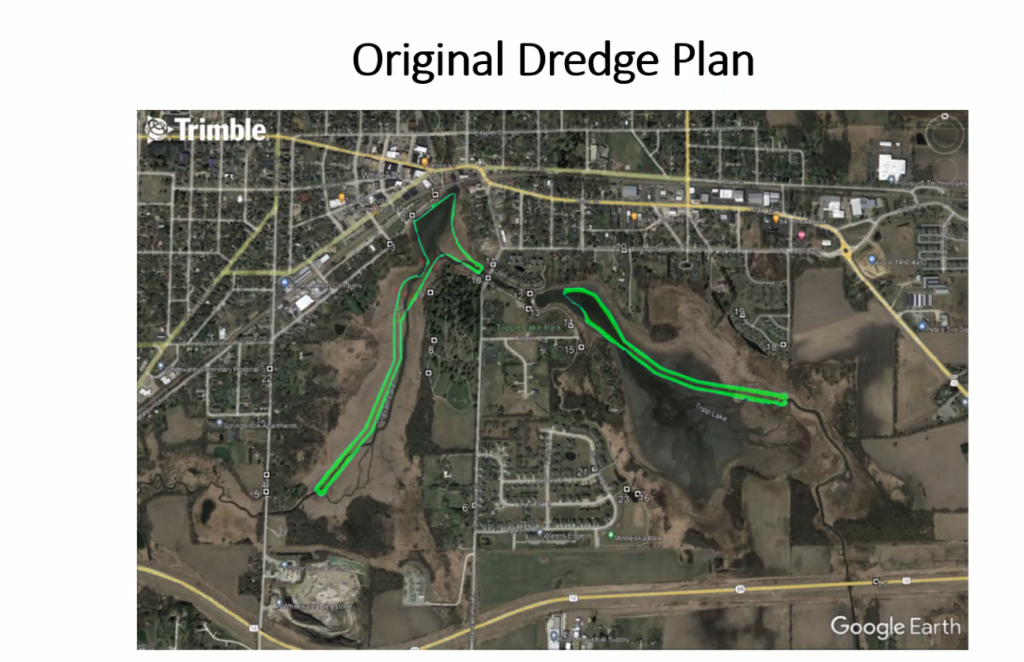
A slide, labeled “Original Dredge Plan” is shared Tuesday with members of the Whitewater Common Council as part of an update about the Trippe and Cravath lakes dredging project.
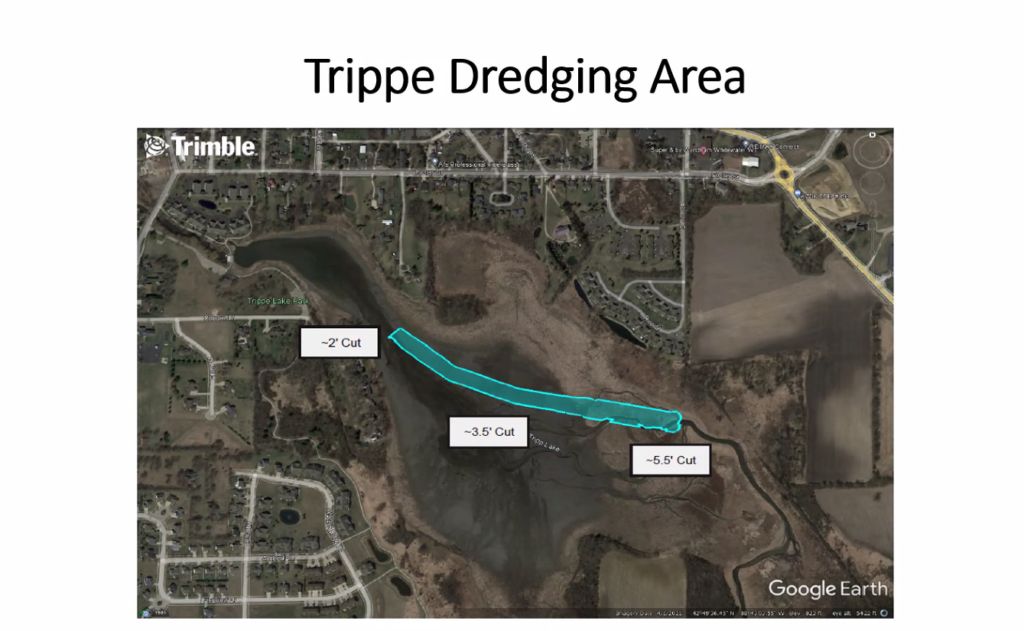
A slide, labeled “Trippe Dredging Area” shows area dredged within Trippe Lake, according to information shared with members of the Whitewater Common Council Tuesday.
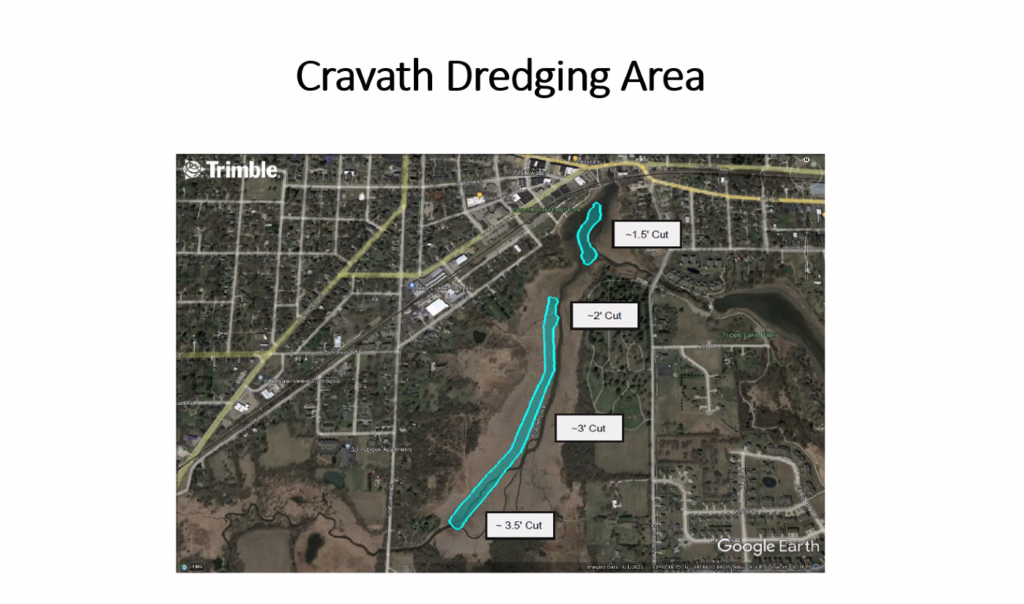
A slide, labeled “Cravath Dredging Area” shows area dredged within Cravath Lake, according to information shared with members of the Whitewater Common Council Tuesday.
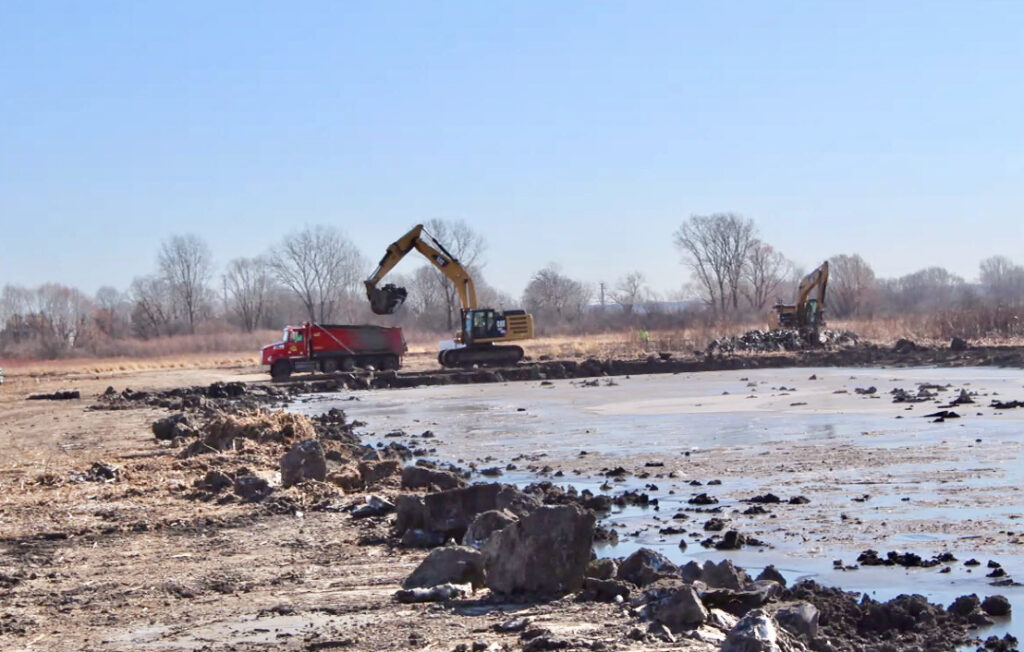
A photo, shared as part of an update on dredging within the Trippe and Cravath lakebed, shows a navigational channel created in Trippe Lake, City of Whitewater Parks and Recreation Director Eric Boettcher told members of the Whitewater Common Council Tuesday.
This post has already been read 2877 times!
